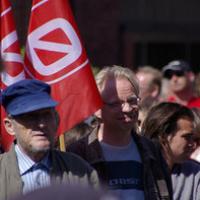
Red-Green Alliance trebles its vote
Last Thursday night, 15 September, it became clear that in Denmark’s general election the right-wing government of Lars Lokke Rasmussen had lost power even though not by a large margin. It had consisted of the Liberal Party and the Conservatives with the racist Danish People’s Party as a support party. The Social Democrats, under their leader Helle Thorning-Schmidt, are now to form a new coalition after ten years out of government. Negotiations mean they are likely to rule in coalition with the Social Liberal Party and the Socialist People’s Party, with the Red Green Alliance as a likely support party.
The Social Democrats actually had their worst election for100 years and one of their allies, the Socialist People’s Party, also went down. However, they can still form a government due to the increased number of votes for the Social Liberals and the Red Green Alliance.
The Red-Greens were the only ones to challenge right wing capitalist policies and racism. They achieved an all time high, increasing their representation from four seats to twelve with a total of 6.7 percent of the votes. In the working class district of Nørrebro in Copenhagen they increased their vote from 12 to 27 percent.
After ten years with the outgoing right-wing government, people had had enough. In August, a study showed that inequality in Denmark has increased dramatically. In seven years the number of poor people in Denmark increased by 108,000 people. At the same time, almost all parties, even the the Socialist People’s Party, let the racist Danish People’s Party set the agenda with its defence of the notorious ‘Muhammad Caricatures’ as a main issue in the political debate, alongside laws against veils and extreme anti-immigration rules. During the election campaign, the Socialist People’s Party showed themselves open to the idea of "practical cooperation" with the Danish People’s Party.
But in the election campaign itself, the immigration and integration issues did not dominate; it was rather the economy, jobs and welfare. Most analysts were talking in advance about the new government not being likely to involve any change of course, either in economic policy or immigration policy. This was confirmed by the in-coming Social Democratic prime minister, Helle Thorning-Smith. Before the election, the Social Liberals made a contract with the right-wing government to ‘reform’ (attack) pensions, early retirement and unemployment benefits. Despite this, the Social Democrats will now do everything possible to get the Social Liberals on board, alongside the Socialist People’s Party.
The composition and policies of the Social Democraitc coalition suggests that the joy of having struck down the old right-wing government could quickly turn into disappointment. The new government, for example, will launch an additional hour of work per worker per week to pay for the crisis. Unemployment is increasing and in the coming year, 38,000 long term unemployed will lose their benefits.
The Red Greens are ready to support the new government. However while its formation can be supported now in order to keep out the right, this backing must not extend to the pro-capitalist policies which the Social Democrat leaders are sure to pursue. If, as indicated, Red Green leaders are even prepared to take ministerial posts, this will be further proof of a turn to the right in their policies. "We have shown that it pays to innovate without compromising our principles,” says Frank Aan, a politician of the Copenhagen Enhedslisten (Red-Green Alliance) to the newspaper Politiken. He explains how they have become more ’concrete’: "Instead of saying that the rich should pay, we say now that tax cuts must be rolled back. Instead of saying that the banks should be nationalised, we say now that we are against aid packages to the banks".
However, within the Red-Greens there are broad layers that are critical of the rightward course of the party. They want to push the party towards intervening in, and supporting, the struggles from below of workers and youth. The much increased electoral support for the Red-Greens in itself shows that people want a real change. The new coalition may not last long given the thin majority (of five seats) and the developing problems in the economy. Precisely these problems mean that Denmark is entering a new period which would provide fertile ground for developing a real alternative left workers’ party.

Be the first to comment